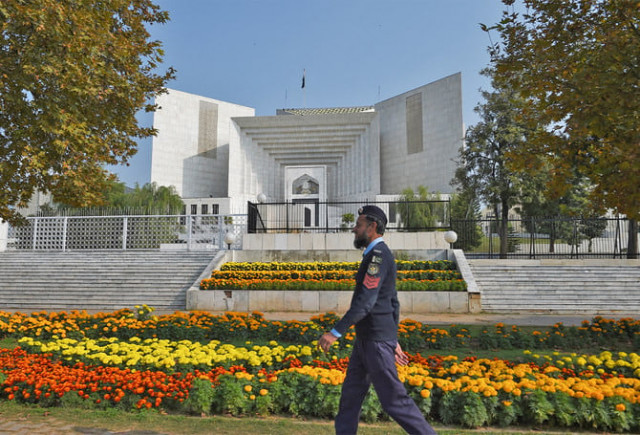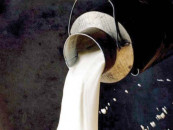SC's Punjab polls ruling: Harbinger of judicial war?
CJP could not evolve a strategy to end the perception that only some judges are interested to hold elections in Punjab

Despite facing legal impediments put by one section of the Supreme Court judges, Chief Justice of Pakistan (CJP) Umar Ata Bandial and two “like-minded” judges have emerged “victorious” by announcing the date for elections in Punjab Assembly.
The Pakistan Tehreek-e-Insaf (PTI) is as jubilant over the SC's decision as the Pakistan Democratic Movement (PDM) parties were in April last year when the court had quashed a ruling of National Assembly’s deputy speaker and directed then NA speaker to complete the process of no confidence against former prime minister Imran Khan as per a schedule given by the court itself.
Even the PTI had severally criticized these judges at that time.
Commenting on Tuesday's verdict, PTI’s Lawyer Maleeka Bukhari said the order is a ray of hope during the rule of “an autocratic regime mired in illegalities and worst human rights violations”.
"I want to pay tribute to the honorable judges of the Supreme Court, in particular the honorable CJP. Despite personal attacks, humiliating propaganda and threats the honorable judges showed immense strength and integrity.
“They have emerged as the true defenders of the Constitution.
“The honorable judges defended the Constitution of Pakistan and the fundamental right of Pakistanis to cast their vote without fear or coercion. Today’s order is a win for the people of Pakistan and an important step in strengthening democracy," she said.
However, CJP Bandial could not evolve a strategy to end the perception that only some particular judges are interested to hold elections in Punjab.
"When a judicial history is written, today's judgment will be seen as the beginning of a judicial civil war in the Supreme Court,” said renowned lawyer Faisal Siddiqi.
Two SC judges—Justice Ijazul Ahsan and Justice Sayyed Mazahar Ali Akbar Naqvi—on February 16 requested CJP Bandial to take suo motu notice of delay in announcement of polls in Punjab while hearing a service matter.
Subsequently, the CJP had started suo motu proceedings by forming a nine-judge bench to hear the matter despite the fact that the same matter had been pending in the Lahore High Court (LHC).
Interestingly, the CJP did not include two senior most judges—Justice Qazi Faez Isa and Justice Sardar Tariq Masood—in the bench that he was himself leading.
After judicial notes of some judges, CJP Bandial reconstituted a five judge larger bench to hear the matter. According to Justice Syed Mansoor Ali Shah, Justice Ijazul Ahsan and Justice Naqvi had recused themselves from hearing the matter.
Two more judges, who held that the suo motu case was unjustified, were also excluded from the bench.
Now questions are being raised as to how Justice Ahsan could hear the matter which he had earlier decided not to hear. However, CJP Bandial says there is nothing on record that Justice Ahsan had recused himself.
It is said that one group of judges has consistently adjudicated political cases during CJP Bandial's tenure. Some judges have even raised their voices in their judicial orders, calling for regulating the CJP’s powers to form benches and fix cases.
Though the Supreme Court is being appreciated for compelling the Election Commission of Pakistan (ECP) and other executive authorities to hold elections in Punjab within 90 days, serious legal issues have not been resolved due to lack of due process.
Firstly, the SC invoked suo motu jurisdiction in a matter which was already pending in the LHC. Even four judges declared that suo motu notice was unjustified as the same issue was being heard by the LHC.
Instead of issuing an order of the court to end the controversy about the judgment, CJP Bandial and two like-minded judges held that the opinion of Justice Syed Mansoor Ali Shah and Justice Jamal Khan Mandokhail was “erroneous”.
Questions have also arisen over whether these three judges can resolve the controversy about non issuance of the order of the court by holding in a fresh case that the two judges’ opinion is in minority.
In the present circumstances, Justice Athar Minallah's detailed opinion will be crucial to ascertain as to whether the suo motu case was dismissed by a vote of 4 to 3 or was upheld by a vote of 3 to 2.
The division in the apex court may further widen after a six-judge larger bench on Tuesday held that the judicial order of Justice Qazi Faez Isa and Justice Aminuddin Khan was ineffective.
Both the judges held that hearing of all cases under Article 184 (3) of Constitution be postponed until amendments in the SC Rules 1980 about discretionary powers of the CJP to form special benches.
Whether a sub judice matter can be transferred from one bench to another for getting favourable results? This precedent will undermine the independence of judges and will strengthen the unfettered powers of the CJP to manipulate benches.
Now the question is: whether a larger bench can review a judicial order without including the author judge and signatory judge? Questions are being raised about the composition of the larger bench in which judges belonging to a particular section were included.
Some legal minds ask as to what will be the legitimacy of the court proceeding if the CJP includes only like-minded judges in a bench. It is learnt that the federal government is waiting for the president to sign on a new piece of legislation regarding the CJP discretionary powers.
The government will move an appeal against Tuesday's judgment once this proposed legislation becomes an act. A senior government official said it seems the bench has passed the order keeping in mind the time needed to make the legislation effective.
Legal expert Reema Omer said the CJP’s “arbitrary, dictatorial management of the SC and mockery of his dissenting peers” show that independence and impartiality of the judiciary are being compromised.
"If we are truly standing with the Constitution then we cannot turn a blind eye to such blatant abuse of power," she added.
Former Sindh High Court Bar Association president Salahuddin Ahmed said the SC judgment is to be viewed on two levels: the merits of its findings and the process of reaching those findings.
"As far as the merits are concerned; the only thing surprising about the judgment is the fact that no directions were given in relation to elections in the K-P on the pretext that the advocate for the KP governor had withdrawn representation.
“Surely, withdrawal of vakalatnama by an advocate could not be grounds to delay the right to vote for a province of 35 million people. After all, the Constitution is equally applicable to the K-P as it is to Punjab.
“If it was necessary to hear the K-P governor, the skies would not have fallen if a joint decision regarding both provinces was rendered a day or two later.
“Instead, the part of the judgment that holds – as far as funds are concerned – that they will be utilized for Punjab first and thereafter any leftover shall be used for elections in the K-P is likely to create severe resentments besides being discriminatory and constitutionally suspect," he said.
"This brings us to the process of reaching the judgment. The haste in which the case was heard; the refusal to hold a full court hearing despite pleas by various parties and no objection by the petitioners and the manner in which a bench of nine was whittled down to three naturally gives rise to suspicions
“It creates the impression that the existing bench was unwilling to countenance a contrary view from any quarter. Had this matter been decided by a full court no matter with what division, it would have finally laid the matter to rest.
“Instead, the manner in which the case was heard will give the government an excuse to avoid elections. It will prolong the present uncertainty," he added.



















COMMENTS
Comments are moderated and generally will be posted if they are on-topic and not abusive.
For more information, please see our Comments FAQ